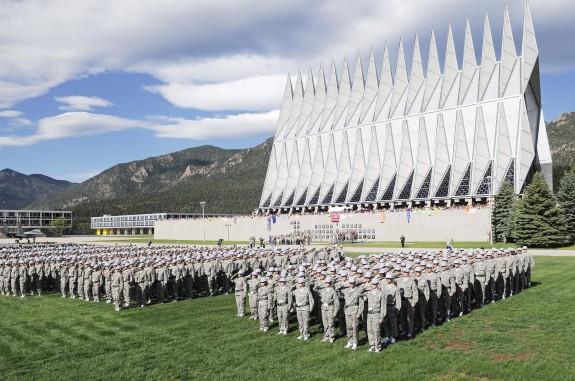
The long-smoldering debate at the U.S. Air Force Academy over the role of religion in cadets’ lives has reignited, just as a new class arrives on campus for basic training.
Accusations of improper proselytizing on the Colorado Springs, Colo., campus have been challenged by those who argue that AFA guidelines curtail religious expression.
The two sides recently clashed over a letter from 66 House Republicans urging Defense Secretary Leon Panetta to investigate the USAF’s growing “hostility toward religious freedom” under guidelines set last September by USAF Chief of Staff Gen. Norton Schwartz.
In response to allegations of proselytizing, Schwarz mandated that only chaplains could endorse religious programs.
But the congressional letter argues that the new policy goes too far.
“While we agree that leaders should not use their positions to impose their religious beliefs or extend preferential treatment to those who share their beliefs, the decisions that have been made in reliance upon this policy go beyond what is required by the U.S. Constitution,” the letter reads.
The Chaplain Alliance for Religious Liberty, a conservative Christian organization representing evangelical chaplains, applauded the letter.
“There’s nothing wrong with a commander attending, even publicizing and encouraging … a good and positive event for the morale and the welfare of military personnel,” said executive director and retired Col. Ron Crews, a former chaplain with 28 years of military experience.
“There’s nothing wrong with a commander saying, ‘This is an event that I support and I am going to.’ You’re encouraged to go, but you are not ordered to go,” he said.But David Mullin, a former AFA economics professor, said military culture muddies the distinction between encouragement and orders, so only chaplains should speak on religious matters.
“When a military commander says ‘you are encouraged to attend,’ whether it is to military officers or civilians, that is an effective order,” Mullin said. This constitutes improper proselytism, he added.
A self-described evangelical, Mullin is one of the few to openly criticize what he calls an unhealthy religious climate in the AFA. He is represented in court by the Military Religious Freedom Foundation, a legal watchdog.
Mullin was one of five academy professors who sued unsuccessfully in January 2011 to stop a school prayer luncheon that would feature as keynote speaker a veteran who calls himself a “U.S. Marine for Christ.”
He alleges his dog was poisoned after he protested about the school’s religious climate later that year.











